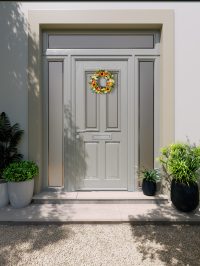Taking the lead on ‘greenwashing’

Apeer says it is ‘taking the lead’ in the composite door sector by independently testing its products and exposing significant shortfalls in competitors’ U-value compliance.
“There’s a lot of greenwashing happening in this industry,” says Asa McGillian, Apeer’s managing director. “Some companies claim their doors meet strict U-value regulations when they clearly don’t. That’s misleading for both installers and homeowners – and it erodes trust in the entire sector. We believe in transparency and independent testing, so customers know they’re getting exactly what they pay for.”
Asa adds that Apeer has demonstrated that not all composite doors perform as advertised, with testing at TÜV Rheinland and IFT Rosenheim confirmeing that while many manufacturers claim compliance, their products fail to meet even the basic minimum standards.
Apeer’s own 70mm high-density foam-filled doors comfortably achieve a U-value of 0.85 W/m²K, with the company conservatively declaring 0.9 W/m²K. By contrast, a leading competitor’s hollow monocoque design is said to have failed to reach even the minimum required 1.4 W/m²K.
Unlike the industry standard 44mm slab, Apeer’s 70mm construction is designed to make a significant impact on both thermal retention and security.

- Increased thermal mass helps prevent heat loss, directly benefiting compliance with future Part L regulations.
- Structural integrity is improved, making Apeer doors more resistant to forced entry and general wear.
- A true double-rebated design enhances weatherproofing, eliminating common issues with draughts and moisture ingress.
According to Asa, security also remains a key selling point in the door market. Reinforced with steel and high-impact GRP every Apeer door features:
- Secured by Design accreditation, ensuring compliance with police-approved security standards, including laminated glass and a specially designed letterbox.
- Multipoint locking systems for maximum protection against forced entry
- A double rebate system, significantly improving structural strength compared to single-rebated alternatives.
Beyond technical performance, Apeer is also said to be setting itself apart with design flexibility and premium aesthetics. From timber-effect finishes to the ultra-modern Silkaseamless (formerly Lumi) collection, featuring frameless, edge-to-edge glazing, the brand is bridging the gap between security, energy efficiency, and contemporary style.
Apeer’s commitment to third-party verification and product transparency reflects a growing need for independent performance validation in the composite door sector.
“As we move toward tighter regulations and a more informed customer base, manufacturers need to be clear and honest about what their doors can actually achieve,” McGillian adds. “We’re calling for industry-wide transparency and door-specific, independently assessed verification—because vague compliance claims simply aren’t good enough.”
For trade professionals looking to supply doors that genuinely meet performance standards, Apeer continues to be a trusted leader in the composite door market.
